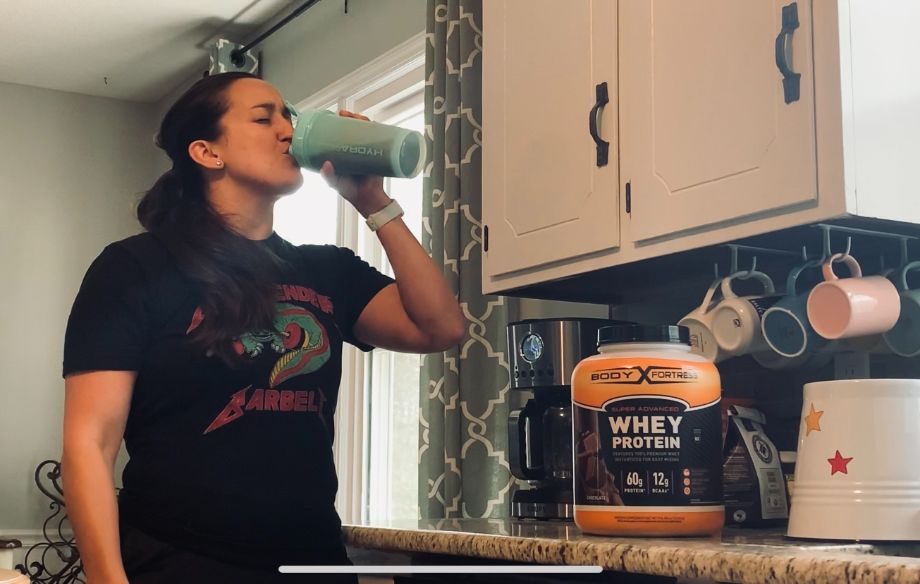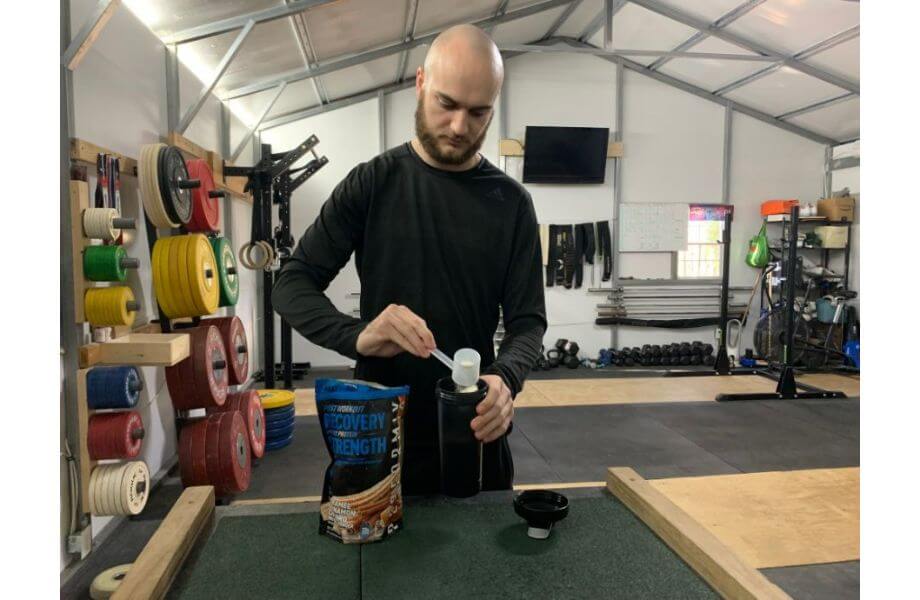We test and review fitness products based on an independent, multi-point methodology. If you use our links to purchase something, we may earn a commission. Read our disclosures.
If you’ve been in the fitness world for any amount of time, you’ve probably noticed some gym-goers rushing to drink their protein almost as soon as they’ve finished their last set. Should we all be drinking protein this quickly, or does the timing even matter?
The best protein shakes are a valuable, convenient source of protein, which we know to be a building block of muscle and incredibly important for—you guessed it—building muscle. Protein is also important for improving body composition and muscle recovery, as well as sustainable weight loss and overall health and wellness.
The best time to drink a protein shake is more nuanced than you might expect. Ultimately, the ideal time will depend on your personal goals, preferences, exercise type, eating schedule, and digestive tolerance. Let’s dive into what the research has to say on the best timing for protein consumption.
Medical disclaimer: This article is intended for educational and informational purposes only. It is not intended as a substitute for medical advice. For health advice, contact a licensed healthcare provider.
When is the Best Time to Drink a Protein Shake?
The best time to drink protein shakes is still being debated by experts. It likely depends on many factors, such as type of exercise, timing of meals, if you exercise in a fasted state, and whether you have specific fitness goals or are simply looking to increase your protein intake for overall health and wellness.
Let’s discuss the pros and cons of the most popular times to drink a protein shake.
Before Or After a Workout
Much of the debate regarding the best time to drink protein shakes revolves around how best to recover from an exercise session. For years, common advice has been to take protein within 30 to 60 minutes directly after working out in order to take advantage of the “anabolic window.”
The anabolic window is a short period of time after a workout during which the body is supposedly best primed to absorb amino acids and use them for muscle repair and muscle building. There’s some truth to this, with the International Society of Sports Nutrition1 advising that taking protein within two hours of a workout can increase the rate at which the body builds muscle.
However, recent research suggests that the typical view of the anabolic window is a little simplistic. According to a 2020 review in Nutrients2 and a 2018 review in the Journal of Orthopaedic and Sports Physical Therapy3, the body’s ability to build muscle mass is heightened for up to 24 to 48 hours after exercise—a much longer window of opportunity than commonly thought.

A 2013 meta-analysis in the Journal of the International Society of Sports Nutrition4 adds to these studies, finding no differences in muscle gain between pre- or post-workout protein and suggesting that the total amount of protein eaten in a day may be more important.
Specific guidance for building muscle suggests eating meals (or shakes) with high-quality protein both before and after exercise, four to six hours apart depending on the size of the earlier meal. In other words, if you eat a large meal before working out, you may not need to eat more protein until up to six hours later. If you had a small snack or exercised fasted, you’ll likely need to eat or drink a protein shake sooner after your workout.
If you do decide to drink a pre-workout protein shake, pay attention to any unpleasant digestive symptoms. Some people tend to feel nauseous during higher-intensity exercise if they drink a protein shake or eat a meal too soon prior to working out. If this happens to you, it may be best to save that shake until after you’re done.
In the Morning
Drinking a protein shake in the morning can be helpful in terms of spreading your protein intake evenly throughout the day, especially if you tend to skip breakfast.
If your goal is to lose weight, a high-protein breakfast containing at least 30 grams of protein after you wake up may help you feel fuller in the morning and less likely to snack on less nutrient-dense foods later in the day.
It’s worth mentioning, though, that a 2018 review in Advances in Nutrition5 notes a solid breakfast may be more effective than liquid ones like protein shakes or smoothies. Keeping track of your hunger levels can help you decide whether drinking a protein shake in the morning is helpful for you or not.
Before Bed
The rationale for drinking a protein shake before bed is to remain in a state of anabolism during sleep, meaning that the body will use protein to build muscle instead of breaking it down for energy. Research seems to support this, as the International Society of Sports Nutrition1 states that drinking 30 to 40 grams of casein protein before bed can increase muscle protein synthesis.
RELATED: Best Casein Protein Powder
Interestingly, however, a 2022 randomized controlled trial6 found that drinking whey protein before bedtime was equally as effective for building muscle as drinking it in the morning. Similarly, research suggests that the benefits of drinking protein before bed are probably less important than making sure you get enough total protein overall2.

While it isn’t always necessary to drink a protein shake before bed, it may be helpful if you had a small dinner or weren’t able to meet your daily protein goal that day.
Ultimately, deciding on the best time to drink a protein shake is up to you. Focus on getting enough total protein, spreading your protein intake evenly throughout the day, and paying attention to your energy levels and ability to work out efficiently.
Types of Protein Shakes
There are several types of protein you can use for protein shakes.
Whey Protein Powder
Typically considered the “gold standard” of protein powders thanks to its high protein quality and digestibility, whey protein is one of the most popular protein supplements available.
Whey is a byproduct of the cheesemaking process and some people with lactose-intolerance may experience digestive discomfort when using whey protein powder.
Similarly, casein protein powder is also a byproduct of cheesemaking. It’s made by using acid or rennet to curdle milk, causing casein to separate from the whey. It’s digested more slowly than whey but is still one of the best protein powders for muscle gain.
Plant-Based Protein Powder
Plant-based protein powder benefits are wide-ranging, especially for those who follow a vegan diet or are looking for a clean protein powder option. Plant-based protein powders are available using a variety of plant foods as protein sources.
Soy protein powder is one of the most popular supplements considering that soy is one of the few plant-based sources of complete protein, meaning that it provides all nine essential amino acids in optimal amounts.
Pea protein is another popular plant protein thanks to its easy digestibility. Peas are slightly low in the amino acid methionine, so they aren’t considered a complete protein. Brown rice protein is often added to pea protein powders to make up for this.
Other options like chia seed protein and hemp protein are available as well and, like soy, are also considered complete proteins. A nice bonus is that since both chia and hemp seeds are good sources of omega-3 fatty acids, these protein powders can help meet your omega-3 needs.
Related: Best Protein Powder for Weight Loss
How Much Protein Do You Need?
The minimum amount of protein required to prevent deficiency is 0.8 grams of protein per kilogram you weigh, or about 0.36 grams per pound of body weight. However, research suggests that high-protein diets are more beneficial for weight loss, maintenance, and muscle growth following resistance exercise.
The exact amount of protein you need will vary based on factors like your weight, metabolic rate, exercise type, and your health or fitness goals.
To lose weight while minimizing the loss of muscle, recommendations range from a daily protein intake of 1.6 to 2.4 grams of protein per kilogram of body weight. A 2015 review in the American Journal of Clinical Nutrition7 suggests that people who are overweight or obese can benefit from protein intakes of 1.2 to 1.6 grams per kilogram.
For building muscle tissue during resistance training, recommendations vary slightly. The American College of Sports Medicine8 recommends 1.2 to 1.7 grams of protein per kilogram, while a 2018 meta-analysis in the British Journal of Sports Medicine9 found that consuming more than 1.6 grams of protein per kilogram didn’t provide any additional benefits.
In addition to getting enough protein each day, make sure that you’re spreading your protein intake evenly throughout the day as much as possible. Getting 25 to 30 grams in each protein shake and meal has been shown to be helpful for weight loss and maintenance7.
Similarly, the International Society of Sports Nutrition recommends getting 20 to 40 grams of protein every three to four hours for building muscle1. Most protein powders provide between 20 to 30 grams of protein, so mixing a serving of protein powder with water, milk, or a higher-protein non-dairy beverage like soy milk or pea milk should provide you with the recommended amount.
Best Time to Drink a Protein Shake: Final Thoughts
Whether you’re trying to build lean muscle, lose body fat, or simply want to eat a more balanced diet, protein shakes can be a convenient way of increasing your protein consumption and meeting your health and fitness goals.
Overall, there’s no need to stress about rushing to drink a protein shake immediately after you work out. Having a protein shake before or after a workout can both be helpful, but getting enough total protein every day and spreading your protein intake evenly throughout the meals and shakes you consume likely plays the most significant role.
Best Time to Drink a Protein Shake: Q&A
Is it better to drink a protein shake in the morning or at night?
Drinking a protein shake in the morning or at night can have benefits for weight loss and muscle health. So far, research hasn’t shown that one is more effective than the other.
That said, spreading your protein intake throughout the day is important. If you had a large dinner close to bedtime, it may be more beneficial to wait until morning to drink your protein shake. Similarly, you may want to drink a protein shake before bed if you didn’t eat much dinner or plan to have a high-protein breakfast in the morning.
Is it OK to drink a protein shake on an empty stomach?
Drinking protein shakes on an empty stomach should be okay for most people, although some may experience an upset stomach or other digestive issues when drinking a protein shake prior to intense exercise.
When is the best time to drink a protein shake for weight loss?
There isn’t a specific time of day that drinking a protein shake will be most beneficial for weight loss or fat loss.
Drinking a protein shake in the morning can help with satiety and spreading your protein intake more evenly throughout the day, especially if you tend to skip breakfast or gravitate towards breakfast foods that are low in protein. If you prefer, you can also drink a protein shake before or after a workout, or even at bedtime. The most important thing is to spread your protein intake out over the day and to include good sources of protein at meals.
How often should you drink protein shakes?
It’s best to think about protein shakes as supplements. They can be a helpful addition to the diet, but shouldn’t replace well-balanced meals that include quality food sources of protein, carbohydrates, and fat. One to two protein shakes a day should be enough to help you meet your protein goals while leaving plenty of space for nutrient-dense foods.
These statements have not been evaluated by the Food and Drug Administration. This product is not intended to diagnose, treat, cure, or prevent any diseases.
References
- Kerksick CM, Arent S, Schoenfeld BJ, Stout JR, Campbell B, Wilborn CD, Taylor L, Kalman D, Smith-Ryan AE, Kreider RB, Willoughby D, Arciero PJ, VanDusseldorp TA, Ormsbee MJ, Wildman R, Greenwood M, Ziegenfuss TN, Aragon AA, Antonio J. International society of sports nutrition position stand: nutrient timing. J Int Soc Sports Nutr. 2017 Aug 29;14:33. doi: 10.1186/s12970-017-0189-4. PMID: 28919842; PMCID: PMC5596471.
- Arent SM, Cintineo HP, McFadden BA, Chandler AJ, Arent MA. Nutrient Timing: A Garage Door of Opportunity? Nutrients. 2020 Jun 30;12(7):1948. doi: 10.3390/nu12071948. PMID: 32629950; PMCID: PMC7400240.
- Schoenfeld BJ, Aragon AA. Is There a Postworkout Anabolic Window of Opportunity for Nutrient Consumption? Clearing up Controversies. J Orthop Sports Phys Ther. 2018 Dec;48(12):911-914. doi: 10.2519/jospt.2018.0615. PMID: 30702982.
- Schoenfeld BJ, Aragon AA, Krieger JW. The effect of protein timing on muscle strength and hypertrophy: a meta-analysis. J Int Soc Sports Nutr. 2013 Dec 3;10(1):53. doi: 10.1186/1550-2783-10-53. PMID: 24299050; PMCID: PMC3879660.
- Gwin JA, Leidy HJ. A Review of the Evidence Surrounding the Effects of Breakfast Consumption on Mechanisms of Weight Management. Adv Nutr. 2018 Nov 1;9(6):717-725. doi: 10.1093/advances/nmy047. PMID: 30204837; PMCID: PMC6247188.
- Chen Y, Liang Y, Guo H, Meng K, Qiu J, Benardot D. Muscle-Related Effect of Whey Protein and Vitamin D3 Supplementation Provided before or after Bedtime in Males Undergoing Resistance Training. Nutrients. 2022 May 30;14(11):2289. doi: 10.3390/nu14112289. PMID: 35684089; PMCID: PMC9183069.
- Leidy HJ, Clifton PM, Astrup A, Wycherley TP, Westerterp-Plantenga MS, Luscombe-Marsh ND, Woods SC, Mattes RD. The role of protein in weight loss and maintenance. Am J Clin Nutr. 2015 Jun;101(6):1320S-1329S. doi: 10.3945/ajcn.114.084038. Epub 2015 Apr 29. PMID: 25926512.
- American College of Sports Medicine. Protein Intake for Optimal Muscle Maintenance. https://www.acsm.org/docs/default-source/files-for-resource-library/protein-intake-for-optimal-muscle-maintenance.pdf. Accessed 4/12/23.
- Morton RW, Murphy KT, McKellar SR, Schoenfeld BJ, Henselmans M, Helms E, Aragon AA, Devries MC, Banfield L, Krieger JW, Phillips SM. A systematic review, meta-analysis and meta-regression of the effect of protein supplementation on resistance training-induced gains in muscle mass and strength in healthy adults. Br J Sports Med. 2018 Mar;52(6):376-384. doi: 10.1136/bjsports-2017-097608. Epub 2017 Jul 11. Erratum in: Br J Sports Med. 2020 Oct;54(19):e7. PMID: 28698222; PMCID: PMC5867436.
Further reading

If you’ve been in the fitness world for any amount of time, you’ve probably noticed some gym-goers rushing to drink their protein almost as soon as they’ve finished their last set. Should we all be drinking protein this quickly, or does the timing even matter?The best protein shakes are a valuable, convenient source of protein, which we know to be a building block of muscle and incredibly important for—you guessed it—building muscle. » Read more about: Best Time to Drink a Protein Shake, According to a Registered Dietitian » Read more

If you’ve been in the fitness world for any amount of time, you’ve probably noticed some gym-goers rushing to drink their protein almost as soon as they’ve finished their last set. Should we all be drinking protein this quickly, or does the timing even matter?The best protein shakes are a valuable, convenient source of protein, which we know to be a building block of muscle and incredibly important for—you guessed it—building muscle. » Read more about: Best Time to Drink a Protein Shake, According to a Registered Dietitian » Read more

If you need help understanding protein powder labels, this guide can help interpret them to choose the best supplement for you. Read more

The Yoak is one of the most fun, and also versatile pieces of training equipment I have ever used. After doing every movement they've recommended on their website, along with many others, I can confidently say that if you're looking to add chaos training to your regimen, as well as increased strength in otherwise unstable positions, The Yoak is a great tool to use; albeit at a high price. Read more

